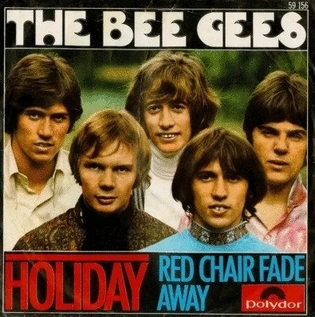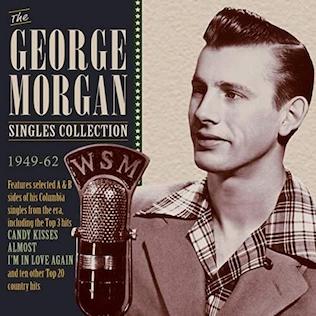Related Research Articles

"Lili Marleen" is a German love song that became popular during World War II throughout Europe and the Mediterranean among both Axis and Allied troops. Written in 1915 as a poem, the song was published in 1937 and was first recorded by Lale Andersen in 1939 as "Das Mädchen unter der Laterne". The song is also well known on a version performed by Marlene Dietrich.

Finger Eleven is a Canadian rock band from Burlington, Ontario, formed in 1990. They have released seven studio albums, with their album The Greyest of Blue Skies bringing them into the mainstream. Their 2003 self-titled album achieved Gold status in the United States and Platinum in Canada, largely from the success of the single "One Thing", which marked the band's first placing on the US Hot 100 Chart at number 16. Their 2007 album, Them vs. You vs. Me launched the single "Paralyzer", which went on to top the Canadian Hot 100 and both US rock charts, as well as reaching No. 6 on the US Hot 100 and No. 12 on the Australian Singles Chart. They won the Juno Award for Rock Album of the Year in 2008. The same album was later certified gold in the US and multi-platinum in Canada. They released their sixth studio album, Life Turns Electric, on October 5, 2010; it was nominated as Best Rock Album of the Year at the Juno Awards of 2011. Five Crooked Lines, their 7th studio album, was released in 2015. Between 1995 and 2016, Finger Eleven was among the top 75 best-selling Canadian artists in Canada and among the top 25 best-selling Canadian bands in Canada. In 2023, the band released a compilation album titled Greatest Hits.
"Bésame Mucho" is a bolero song written in 1932 by Mexican songwriter Consuelo Velázquez. It is one of the most popular songs of the 20th century and one of the most important songs in the history of Latin music. It was recognized in 1999 as the most recorded and covered song in Spanish of all time. Famous versions were sung by Trio Los Panchos and female vocalist Gigliola Cinquetti in 1968, and by Dalida in 1976. English lyrics to it were written by Sunny Skylar. It inspired the cult indian song, Yeh Samaa Samaa Hai Pyar Ka, sung by Lata Mangeshkar in the film Jab Jab Phool Khile
The popular song "Moon Over Miami" was written in 1935 by songwriters Joe Burke and Edgar Leslie. The music was used in the 1941 film Moon Over Miami being played during the opening credits and also played as dance music at both parties.

"Pretty Baby" is a song written by Tony Jackson during the Ragtime era. The song was remembered as being prominent in Jackson's repertory before he left New Orleans in 1912, but was not published until 1916.
"500 Miles" is a song made popular in the United States and Europe during the 1960s folk revival. The simple repetitive lyrics offer a lament by a traveler who is far from home, out of money and too ashamed to return.

"How Can You Mend a Broken Heart" is a song released by the Bee Gees in 1971. It was written by Barry and Robin Gibb and was the first single on the group's 1971 album Trafalgar. It was their first US No. 1 single and also reached No. 1 in Cashbox magazine for two weeks.

"Holiday" is a song released by the Bee Gees in the United States in September 1967. It appeared on the album Bee Gees' 1st. The song was not released as a single in their native United Kingdom because Polydor UK released the single "World" from their next album Horizontal.

Hymne à l'amour, or Hymn to Love, is a 1949 French song with words by Édith Piaf and music by Marguerite Monnot. It was first sung by Piaf that year and recorded by her in the 1950s for Columbia records.
"Mañana " is a popular song that was written by Peggy Lee and her first husband Dave Barbour and published in 1947. Peggy Lee recorded the song on November 25, 1947, with Dave Barbour's orchestra as backing. Released by Capitol Records, it became her biggest chart hit. For the week ending January 23, 1948, the single entered Billboard's Best Sellers chart, where it spent 21 weeks, nine of those at number one.

"My Prayer" is a 1939 popular song with music by salon violinist Georges Boulanger and lyrics by Carlos Gomez Barrera and Jimmy Kennedy. It was originally written by Boulanger with the title Avant de mourir 1926. The lyrics for this version were added by Kennedy in 1939.
"You Can Have Him" is a popular song written by Irving Berlin for the 1949 musical Miss Liberty, where it was introduced by Allyn McLerie and Mary McCarty.

The Agonist was a Canadian deathcore band from Montreal, Quebec, formed in 2004. The last known lineup consisted of lead guitarist Danny Marino, bassist Chris Kells, drummer Simon Mckay, rhythm guitarist Pascal "Paco" Jobin and lead vocalist Vicky Psarakis, who joined in March 2014 following the departure of vocalist and founding member Alissa White-Gluz.

There for Tomorrow was an American rock band that was originally formed in Orlando, Florida in February of 2003. The original group consisted of: Vocalist Maika Maile, drummer Chris Kamrada, guitarist James Flaherty, and bassist Jay Enriquez. Christian Climer joined the band in 2006 when the band was looking for a new member after James left in 2005. The band was influenced by bands such as Jimmy Eat World, Third Eye Blind, Blink-182, and the Hives.
Cunter is a five-piece hardcore punk supergroup from Brampton, Ontario whose members are from Moneen, Alexisonfire, BWC Studios and The Abandoned Hearts Club. The band motto is "All intensity, all the time," and they are known for short, ferociously intense songs.

"Candy Kisses" is a 1949 song written and recorded by American country crooner George Morgan. "Candy Kisses" was George Morgan's debut release on the charts and was his only #1 on the Best Selling Folk charts, where it stayed for three weeks. The B-side of "Candy Kisses", a song entitled, "Please Don't Let Me Love You" reached #4 on the same chart.
Together were an English electronic/rave group, best known for their hit single "Hardcore Uproar", which made number 12 in the UK Singles Chart in August 1990.
"Sunrise, Sunset" is a song from the musical Fiddler on the Roof written in 1964 by composer Jerry Bock and lyricist Sheldon Harnick. The song is performed at the wedding of Tzeitel. The two parents sing about how they can't believe their daughter and her groom have grown up, while Hodel and Perchik sing about whether there may be a wedding in the near future for them.
References
- ↑ "Discogs.com". Discogs.com. Retrieved May 12, 2020.
- ↑ "Archive.org". archive.org. Retrieved May 12, 2020.
- ↑ "- YouTube". YouTube .
- ↑ Whitburn, Joel (1973). Top Pop Records 1940-1955. Record Research.